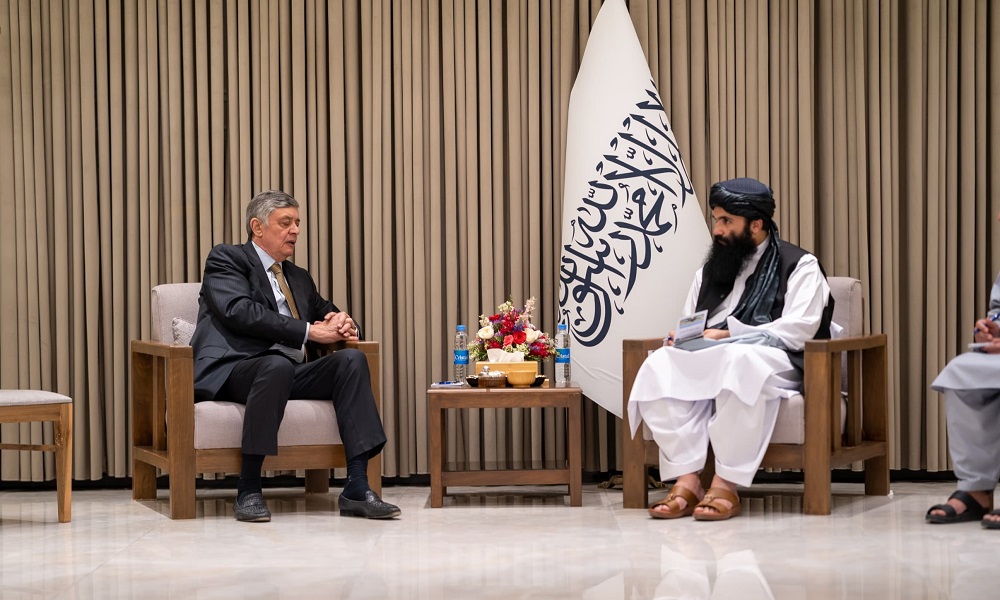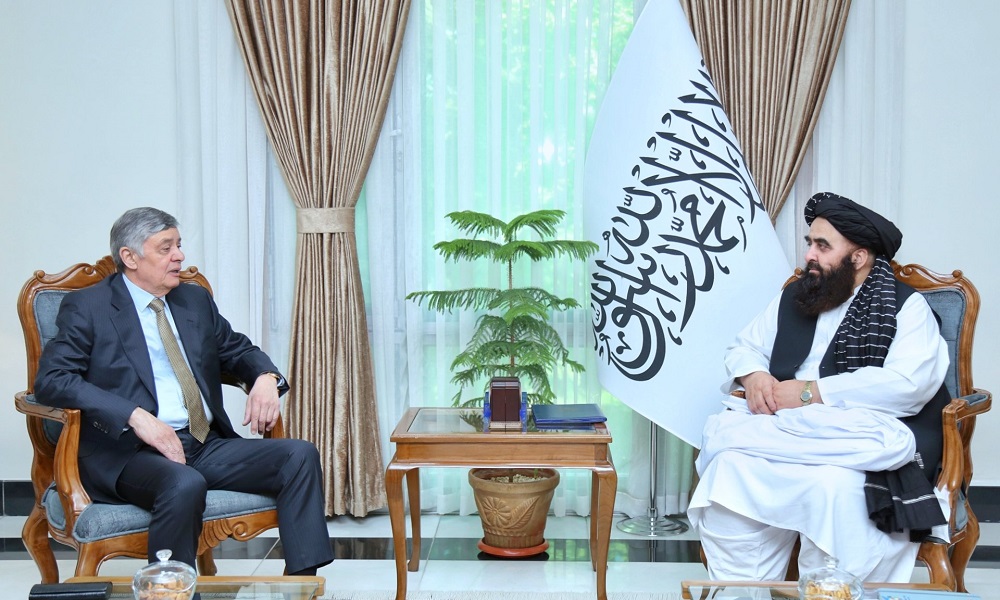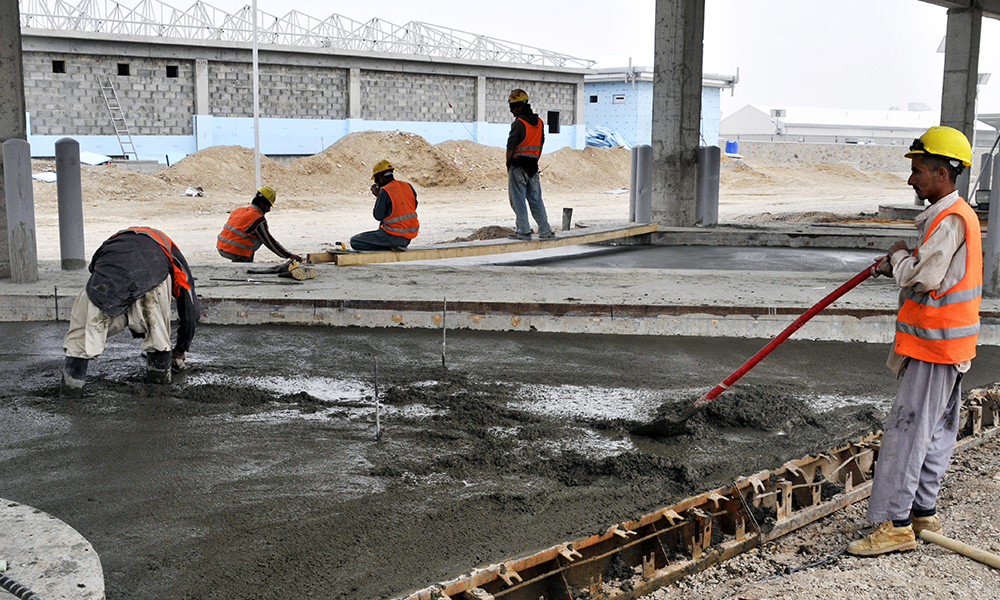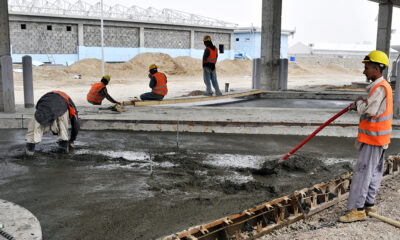Latest News
UN moves to unlock stuck climate financing for Afghanistan
If successful, this would be the first time new international climate finance would flow into the arid, mountainous nation in three years.

United Nations agencies are trying to unlock key climate financing for Afghanistan, one of the world’s most vulnerable countries to climate change which has not received approval for any fresh such funds since the 2021 Islamic Emirate takeover, Reuters reported citing two U.N. officials.
Plagued by drought and deadly floods, Afghanistan has been unable to access U.N. climate funds due to political and procedural issues since the IEA came to power.
But with the population growing more desperate as climate woes stack up, U.N. agencies are hoping to unseal project financing for the fragile country to boost its resilience.
If successful, this would be the first time new international climate finance would flow into the arid, mountainous nation in three years.
“There are no climate sceptics in Afghanistan,” said Dick Trenchard, U.N. Food and Agriculture Organization (FAO) country director for Afghanistan. “You see the impact of climate change and its environmental effects everywhere you go.”
Two U.N. agencies are currently drawing together proposals they hope to submit next year to shore up nearly $19 million in financing from the U.N’s Global Environment Facility (GEF), part of the financial mechanism of the 2015 U.N. Paris Agreement on climate change.
These include the FAO, which hopes to get support for a project costing $10 million that would improve rangeland, forest and watershed management across up to four provinces in Afghanistan, while avoiding giving money directly to IEA authorities.
The U.N. Development Programme, meanwhile, hopes to secure $8.9 million to improve the resilience of rural communities where livelihoods are threatened by increasingly erratic weather patterns, the agency told Reuters. If that goes ahead, it plans to seek another $20 million project.
“We’re in conversations with the GEF, the Green Climate Fund, the Adaptation Fund – all these major climate financing bodies – to reopen the pipeline and get resources into the country, again, bypassing the de facto authorities,” said Stephen Rodriques, UNDP resident representative for Afghanistan.
National governments often work alongside accredited agencies to implement projects that have received U.N. climate funds. But because the IEA government is not recognised by U.N. member states, U.N. agencies would both make the request and serve as the on-the-ground partner to carry out the project.
FLOODS, DROUGHT
“If one of the countries most impacted by climate change in the world cannot have access to (international climate funds), it means something isn’t working,” Rodriques said, adding that any funds should come alongside continued dialogue on human and women’s rights.
Flash floods have killed hundreds in Afghanistan this year, and the heavily agriculture-dependent country suffered through one of the worst droughts in decades that ended last year. Many subsistence farmers, who make up much of the population, face deepening food insecurity in one of the world’s poorest countries.
The FAO and UNDP will need to receive initial approvals by the GEF secretariat before they can submit their full proposals for a final decision from the GEF Council, which comprises representatives from 32 member states.
If the agencies get that first green light, Trenchard said, they would aim to submit their proposals in early 2025.
We “are awaiting guidance as to whether it would be possible to proceed,” Trenchard said.
No foreign capital has formally recognised the IEA government, and many of its members are subject to sanctions. The United States has frozen billions in central bank funds since the IEA took over and imposed restrictions on education of girls and women.
Many human rights activists have condemned the IEA’s policies and some have questioned whether interaction with the IEA and funnelling funds into the country could undermine foreign governments’ calls for a reversal on women’s rights restrictions.
The IEA says it respects women’s rights in accordance with Sharia law.
Countries mired in conflict and its aftermath say they have struggled to access private investment, as they are seen as too risky. That means U.N. funds are even more critical to their populations, many of whom have been displaced by war and weather.
IEA members are attending the ongoing annual U.N. climate negotiations COP29 in Baku, Azerbaijan as observers for the first time.
The IEA’s presence could build trust between Afghanistan and international donors, said Abdulhadi Achakzai, founder of the Afghanistan climate nonprofit Environmental Protection Trainings and Development Organization, on the sidelines of COP29.
“It will be a safer world for the future to include Afghanistan officially in the agenda,” he said. “We see this is an opportunity. There are funds for Afghanistan, we just need to secure it.”
Latest News
Moscow’s move a ‘significant step toward recognizing Afghanistan’s political realities’, says Haqqani

Acting Minister of Interior Sirajuddin Haqqani on Wednesday met with Zamir Kabulov, Russia’s special envoy for Afghanistan, and Dmitry Zhirnov, Russia’s ambassador to Kabul.
Haqqani expressed appreciation for Moscow’s recent decision to remove the Islamic Emirate from its list of terrorist organizations. He described the move as “a significant step toward recognizing the political realities of Afghanistan.”
In a statement, the interior ministry said that both sides emphasized the importance of upgrading diplomatic relations to the level of embassies and reaffirmed their commitment to mutual cooperation in the fields of security and trade.
During the meeting, the two parties also discussed regional and bilateral cooperation in the areas of security, economy, and commerce, and stressed the need to strengthen ties between the two countries.
Latest News
Special meeting will be held to launch Afghanistan–Russia joint commission, says Kabulov

Zamir Kabulov, Russia’s special envoy for Afghanistan, on Wednesday met with Afghanistan’s Acting Minister of Foreign Affairs Amir Khan Muttaqi in Kabul and said a special meeting will be held on the sidelines of the Kazan Forum to officially launch the permanent joint commission between Russia and Afghanistan.
According to a statement issued by the Afghan foreign ministry, Kabulov said that expanding relations with Afghanistan is important to Russia, and for that purpose, Moscow has taken steps to remove obstacles in the path of developing bilateral ties.
This comes after Moscow last week removed the Islamic Emirate from their list of militant organizations.
During the meeting, Muttaqi expressed appreciation for Russia’s recent move to remove the IEA from its list of banned organizations and stated that the Islamic Emirate will soon appoint a diplomat at the ambassadorial level to serve in Moscow.
The two sides also discussed enhancing bilateral relations between Afghanistan and Russia, expanding economic and trade cooperation, and addressing certain regional issues.
The 16th International Economic Forum “Russia – Islamic World: Kazan Forum” will be held from May 13 to 18 in the city of Kazan, Russia. Afghan products and goods will be showcased at the event.
Latest News
Balochistan business chamber asks Islamabad to issue work permits to Afghan refugees
This comes amid Pakistan’s ongoing campaign to expel hundreds of thousands of Afghan refugees living in the country.

The Balochistan Chamber of Commerce and Industry in Quetta, Pakistan, has appealed to the federal government to issue work permits to skilled Afghan refugees who work in various sectors including mining and agriculture.
Haji Akhtar Kakar, the vice president of the chamber of commerce and industry, made the request while pointing out that the existing shortage of skilled labour could worsen further if the issue was not addressed promptly, Dawn news reported.
This comes amid Pakistan’s ongoing campaign to expel hundreds of thousands of Afghan refugees living in the country.
Akhtar said however that due to Balochistan’s deteriorating security situation, mine owners, farmers and industrialists have had to rely on Afghans for skilled labor as Pakistani workers from other provinces were reluctant to move to Balochistan.
According to him, the decision to expel Afghan refugees had severely impacted the agriculture, mining, and industrial sectors in Balochistan, as a significant portion of the workforce came from Afghanistan.
-

 Sport4 days ago
Sport4 days agoAfghanistan qualify for U19 Cricket World Cup 2026
-

 Regional5 days ago
Regional5 days agoDeadliest US strike in Yemen kills 74 at oil terminal, Houthis say
-

 World4 days ago
World4 days agoThousands of protesters rally against Trump across US
-

 World4 days ago
World4 days agoIran, US end nuclear talks in Rome, agree to meet next week
-

 Latest News4 days ago
Latest News4 days agoPolio vaccination campaign launched in Afghanistan
-

 International Sports4 days ago
International Sports4 days agoIPL 2025: 14-year-old Vaibhav Suryavanshi becomes youngest IPL player
-

 Latest News2 days ago
Latest News2 days agoChina invites various Afghan delegations to attend Shanghai forums
-

 International Sports2 days ago
International Sports2 days agoIPL 2025: Robo-Dog ‘Champak’ explained
























